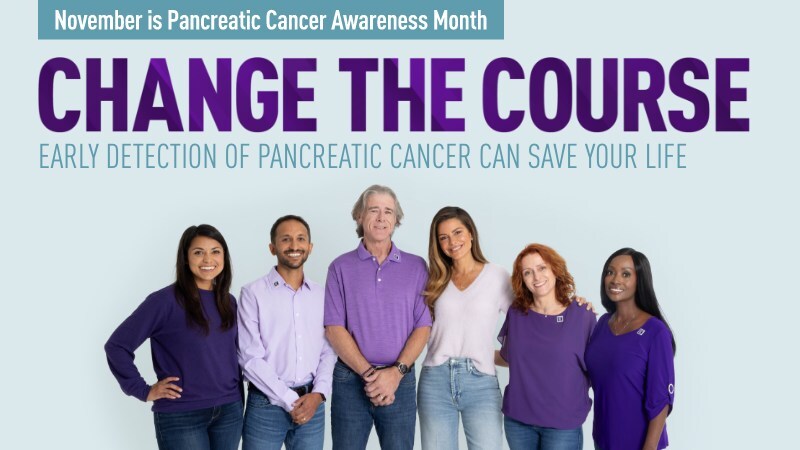November is Pancreatic Cancer Awareness Month, a time dedicated to increasing public understanding of this challenging disease, supporting patients and their families and advancing research for better treatment options.
With pancreatic cancer ranking as one of the deadliest cancers, awareness and education are crucial in the fight to improve early detection and enhance survival rates.
Pancreatic cancer is the third deadliest cancer in the world and is on its way to becoming the second by 2030. The five-year survival rate for pancreatic cancer is just 13 percent.
This month, the Pancreatic Cancer Action Network (PanCAN) is emphasizing the importance of early pancreatic cancer detection and awareness of risks and symptoms in this year’s month-long “Change the Course” campaign.
The campaign encourages people to change the course of the disease through education and awareness about the signs and symptoms of the disease; family history; risk and advocating for your health.
According to a press release from PanCAN, digital and broadcast public service announcements (PSAs) will air throughout the month, sharing stories from survivors and caregivers that showcase how early detection can alter the course of pancreatic cancer and improve survival rates. The campaign will also highlight recent early detection initiatives and outreach efforts to higher-risk groups, including the Ashkenazi Jewish and Black communities, who are disproportionately affected by the disease.
Julie Fleshman, JD, MBA, president and CEO of PanCAN, along with Miss America Madison Marsh, will visit Capitol Hill on November 14 to advocate for raising the Department of Defense’s Pancreatic Cancer Research Program funding to $25 million.
They will also join the greater cancer community in urging Congress to increase the National Institutes of Health (NIH) budget to $51.3 billion, with $7.934 billion designated for the National Cancer Institute (NCI). These meetings are timely, as Congress will be reconvening to negotiate the federal budget before year-end.
The theme of Pancreatic Cancer Awareness Month 2024 at Pancreatic Cancer Canada is “Together, We Can Do More.” In a press release, the organization said this month, it is “dedicated to raising awareness and funds for critical research against one of the world’s most challenging cancers.”
Throughout the month, Pancreatic Cancer Canada said Canadians are encouraged to join fundraising efforts, participate in awareness initiatives and attend a “star-studded axe-throwing event.” The campaign will culminate on November 21, World Pancreatic Cancer Day, when over 40 landmarks across Canada —including the CN Tower, Calgary Tower and Montreal’s Olympic Park — will be illuminated to honor those impacted by pancreatic cancer and advocate for better survival outcomes for the very challenging cancer.
Pancreatic Cancer: A Challenging Cancer with High Unmet Need
Pancreatic cancer remains one of the most difficult cancers to prevent, detect or treat. Most people are unfamiliar with its risk factors and symptoms, and without a standard screening test for early detection, it is often diagnosed in later stages when treatment options are limited.
Pancreatic cancer occurs when cells in the pancreas, a vital organ responsible for producing enzymes and hormones, begin to grow uncontrollably.
It is often referred to as a “silent disease” because symptoms are subtle and may go unnoticed until the disease reaches an advanced stage. Symptoms like abdominal pain, unexplained weight loss, jaundice and digestive issues can appear later, making early diagnosis challenging. By the time pancreatic cancer is typically detected, it has often spread beyond the pancreas, complicating treatment.
Recent trends reveal a rapidly rising incidence of pancreatic cancer among women under 55. Studies also indicate that Gen-Xers and Millennials face a significantly higher risk of developing pancreatic and other cancers compared to previous generations.
In 2024, it is estimated that approximately 66,440 individuals in the US will be diagnosed with pancreatic cancer. Over the past 50 years, there have been only marginal improvements in survival — and yet it remains one of the most overlooked and underfunded cancers.
Pancreatic Cancer Awareness Month 2024: The Importance of Early Detection
Early detection is critical in pancreatic cancer. Unfortunately, only around ten percent of cases are diagnosed at an early stage, when treatment options are most effective.
For this reason, researchers are working hard to find new methods to identify pancreatic cancer sooner.
Routine screenings are currently not widely available, so patients and healthcare providers must remain vigilant, especially in people with higher risk factors, such as a family history of pancreatic cancer, chronic pancreatitis or certain genetic conditions.
Risk Factors and Prevention
Awareness about the risk factors associated with pancreatic cancer is a significant part of prevention efforts. Key factors include:
- Family history: Having close relatives with pancreatic cancer or certain genetic mutations increases risk.
- Smoking: Smoking is a leading risk factor and is thought to double the risk of developing pancreatic cancer.
- Obesity: Excess weight can increase the likelihood of this and other types of cancer.
- Age: The risk of pancreatic cancer increases with age, with most cases occurring in people over 60.
Adopting a healthy lifestyle, including a balanced diet, regular exercise and avoiding tobacco, can help reduce the risk of pancreatic cancer.
Advances in Research and Treatment
The fight against pancreatic cancer has seen encouraging advances in recent years. Research is focused on discovering biomarkers for early detection, developing new drug therapies and exploring immunotherapy options to help the body’s immune system recognize and attack cancer cells. Targeted therapies and clinical trials also offer potential treatment avenues for those diagnosed with the disease.
Some of the following recent developments may lead to promising advancements in pancreatic cancer treatment.
FDA Approvals and Clinical Trials
In February 2024, the US Food and Drug Administration (FDA) approved Ipsen’s Onivyde (liposomal irinotecan) as a first-line treatment for metastatic pancreatic cancer. This approval allows Onivyde to be used earlier in the treatment process, offering new options for patients with advanced disease. The drug was first approved as a second-line treatment for the cancer in adults whose disease has advanced following treatment with standard chemotherapies.
A NIH funded study published in May 2023 highlighted the potential of personalized mRNA vaccines targeting neoantigens in pancreatic cancer. In a small trial, half of the participants exhibited strong anti-tumor immune responses.
Innovative Treatment Approaches
Alligator Bioscience reported this week that its CD40 agonist mitazalimab nearly doubled survival rates in a Phase II trial. The OPTIMIZE-1 trial in first-line metastatic pancreatic cancer demonstrated a confirmed overall response rate of 42.1 percent, a median duration of response of 12.6 months and a median overall survival of 14.9 months. Notably, the 18-month overall survival rate nearly doubled to 36.2 percent compared to 18.6 percent with FOLFIRINOX (the combination of fluorouracil, leucovorin, irinotecan and oxaliplatin) chemotherapy regimen
Researchers at UMass developed a nanoparticle-based delivery system combining immune agonists and senescence-inducing agents. This combination therapy showed significant tumor shrinkage or clearance in preclinical models, indicating potential for future clinical applications.
Early Detection and Diagnostic Tools
Northwell Health implemented an AI technology called iNav to analyze magnetic resonance imaging (MRI) and computed tomography (CT) scans, enabling earlier detection of pancreatic cancer. This approach has reduced the time from diagnosis to treatment initiation by 50 percent, improving patient outcomes.
How to Support Pancreatic Cancer Awareness Month 2024
Raising awareness and showing support for pancreatic cancer patients and their families is essential to the fight against this disease. Here are some ways to get involved:
- Wear purple: The color purple represents pancreatic cancer awareness. Wearing purple throughout November, especially on World Pancreatic Cancer Day, helps start conversations and show solidarity.
- Share information: Educate yourself and others by sharing facts about pancreatic cancer on social media, at work or in your community. Increased awareness can help people recognize symptoms early and seek medical advice sooner.
- Support research: Consider donating to organizations focused on pancreatic cancer research. Contributions can help fund vital studies that bring us closer to early detection methods and more effective treatments.
- Participate in events: Many organizations host walks, fundraisers and awareness events throughout November. Participating in these activities helps raise funds and connects you with others who share a commitment to combating pancreatic cancer.
If you want your company to be featured on Xtalks.com, please email [email protected].












Join or login to leave a comment
JOIN LOGIN